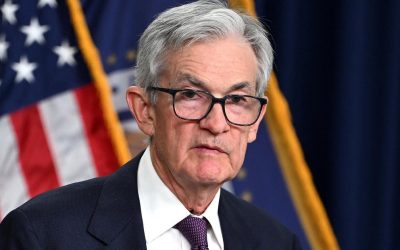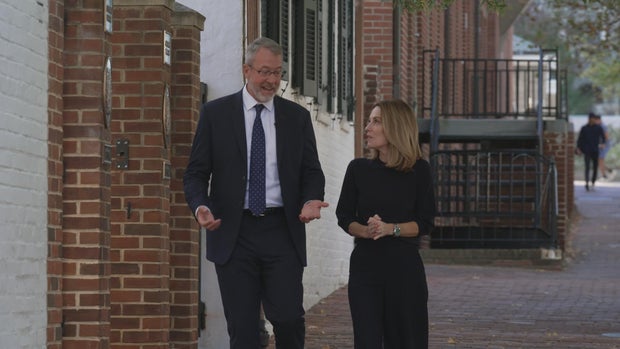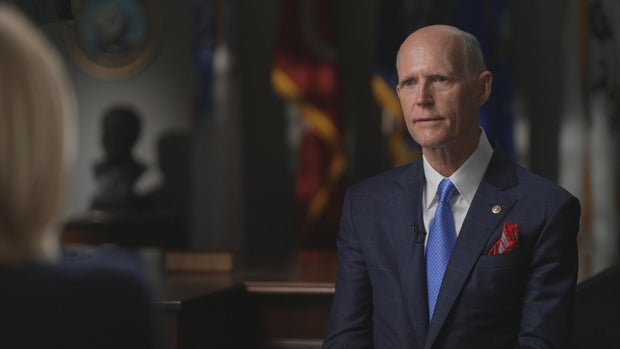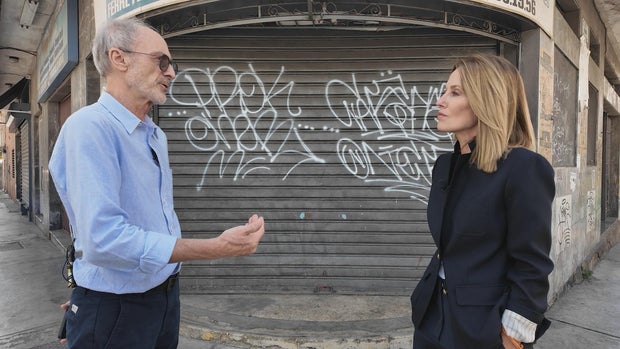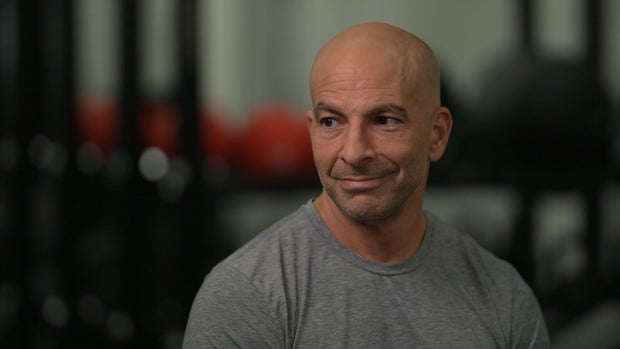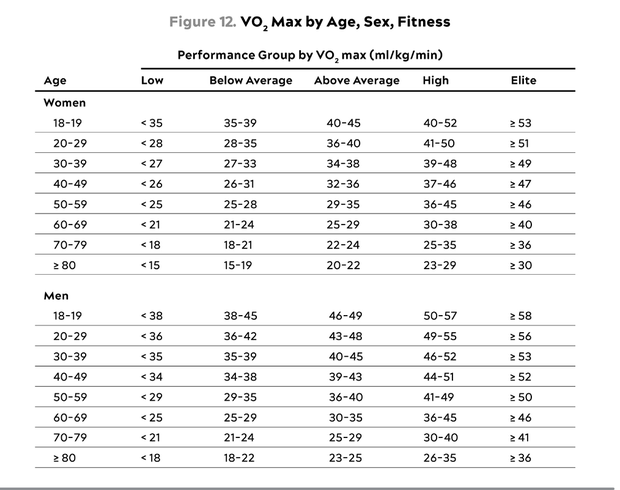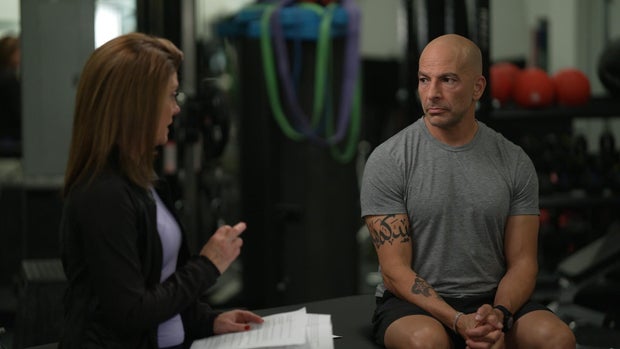A rare look at life inside Nicolás Maduro’s Venezuela as U.S. heightens its pressure campaign
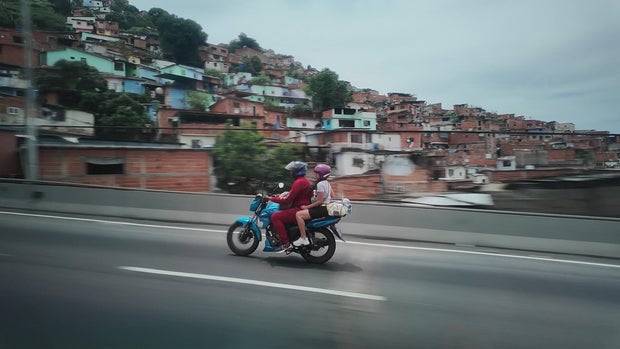
Over the past few weeks, the long, frosty relationship between the U.S. and Venezuela reached a boiling point. The United States launched a series of strikes against vessels alleged to be carrying drugs, calling it a counter-narcotics mission. But the growing military buildup of American forces in the region suggests there may be another target: President Nicolás Maduro, the Venezuelan dictator who’s been in America’s crosshairs for years. This summer, the U.S. Justice Department announced a $50 million reward for information leading to Maduro’s arrest, accusing him of being a drug kingpin. On Friday, the Trump administration escalated its military campaign, sending the world’s largest aircraft carrier to the region. But not much has been seen or heard from people inside Venezuela. Earlier this month, we obtained a rare visa from the Maduro government, packed our bags for Caracas, and found a country on the brink.
A patchwork of stacked, cinder block homes cling to the hillsides of Caracas. Instability isn’t just an architectural feature in Venezuela, it’s a way of life. We saw it at a busy market. There was heated haggling over prices and anxious whispers about the American ships off the coast.
60 Minutes
Sharyn Alfonsi: Are you afraid of the Americans? Or are you afraid about speaking about it?
Woman (Speaking Spanish): Si…
Sharyn Alfonsi: Talking about it. OK. I understand.
Man (Speaking Spanish): “One feels nervous and anxious.” “We don’t want anything to happen.”
This woman chimed in, “The Venezuelan people shouldn’t be held responsible for the actions of its president.”
Just then off camera, a man told her, “You can’t say that. Who provided you with this space to work?” He was wearing a hat with an emblem of the government civilian-military force.
Sharyn Alfonsi: What do you think about what’s going on off the coast?
Roman (Speaking Spanish): “It’s an abusive tactic from America,” he said. “We’re a sovereign country.”
F-35 fighter jets, eight U.S. warships and an estimated 10,000 U.S. troops are now in the Caribbean, with more on the way.
Sharyn Alfonsi: Does it feel like something’s about to happen?
Woman (speaking Spanish): Yes, she said. “It feels very, very heavy.”
The weight of uncertainty and the rumble of armored vehicles can be felt throughout the country. An estimated 125,000 members of Venezuela’s military have mobilized. While we were there, the government was holding emergency drills and urging civilians to prepare for combat. It’s all a bit of theater and a response to this. Since September, the U.S. military has blown up at least 10 vessels, killing more than three dozen alleged drug smugglers, most of them off the coast of Venezuela.
Ambassador James Story: What I can say is that I’ve used this phrase before, this is like cookin’ an egg with a blowtorch. F-35s, Arleigh Burke class destroyers, submarines aren’t normally what we need to go after small boats, fishing boats.
60 Minutes
Ambassador James Story was the last American diplomat at the now closed U.S. embassy in Venezuela. He says the show of U.S. force is likely intended to oust Nicolás Maduro, Venezuela’s dictator.
Ambassador James Story: This is a very bad actor sitting on top of the world’s largest known reserves of oil, plus the critical minerals that will fuel the 21st century economy, and he’s in bed with our strategic competitors.
Sharyn Alfonsi: And how has he been able to cling to power for as long as he has?
Ambassador James Story: I mean, let’s– let’s be very clear. This is a criminal organization masquerading as a government. This is an individual who is under indictment for narcotics trafficking– commits human rights violations. Someone who has used the apparatus of the state to throw people in jail, to torture them, to kill them.
In January, the Trump administration briefly engaged with Maduro’s government. negotiating a deal for the release of six U.S. prisoners, arrested while visiting the country, and for the resumption of flights carrying Venezuelans deported from the United States back to their country. But in August, the olive branch snapped.
U.S. Attorney General Pam Bondi announced that staggering reward for Maduro’s arrest, $50 million. Which is why we were stunned when, after months of negotiations, Maduro agreed to do an interview with us. Maduro’s ministers chose the time and place, the ballroom of a busy hotel in Caracas. But minutes before the interview was finally set to begin, it was called off. We were told the president’s minister of defense and head of intelligence said it was no longer safe to do the interview.
Maduro has been defiant for months despite the bounty on his head, openly challenging the U.S. and its accusations against him in front of crowds of supporters. After he bagged our interview, we thought, perhaps he was packing his bags.
So, we just hopped into a taxicab in Caracas, because we were told that President Maduro has just appeared at a rally in central Caracas for an Indigenous Peoples Day event, which is apparently being held on the middle of a highway. And he’s surrounded by hundreds of people. This is two days after he canceled his interview with us.
Maduro urged the crowd to defend the republic. But privately, he was making concessions. Last week, President Trump confirmed reports that President Maduro offered the U.S. a stake in the country’s oil to avoid conflict.
President Trump: “He has offered everything…. He’s offered everything, you’re right. You know why? Because he doesn’t want to f*** around with the United States.”
Maduro has repeatedly called U.S. accusations that he oversees a narco state, quote, “disinformation.” Most fentanyl is produced in Mexico or China and, according to the DEA, Venezuela is not a major producer of cocaine either, but it is a transit route for it. On Thursday, Maduro appealed for peace, in English.
President Maduro: Not war. Not war. Not war. Yes peace, yes peace. Yes peace.
As a gesture of goodwill, Venezuela is still accepting planes full of deportees from the U.S. Maduro frames their return as a triumph, repatriating Venezuelans from harsh conditions in U.S. detention. But most of the deportees we saw told us they felt defeated. We were with this 4-year-old girl as she was escorted off a plane by a government minister.
And taken into a room where a crush of state TV and her family were waiting. Republican Sen. Rick Scott of Florida says Maduro should hop on a one-way flight himself.
Sen. Rick Scott: If I was Maduro, I’d head to Russia or China right now.
Sharyn Alfonsi: Because?
Sen. Rick Scott: His days are– are numbered. Something’s gonna happen. Whether it’s internal or external, I think something’s gonna happen.
60 Minutes
Sharyn Alfonsi: The firepower that’s off the coast, right, this is an armada, this is a lot of U.S. forces. Are we about to invade Venezuela?
Sen. Rick Scott: I don’t think so. I– I mean, I– I– if we do– I’d be surprised.
Earlier this month, President Trump announced he approved covert CIA operations inside Venezuela.
Sharyn Alfonsi: What do you think removing Maduro would signal to other socialist regimes in the area?
Sen. Rick Scott: It’ll be the end of Cuba.
Cuba relies on subsidized Venezuelan oil to prop up its economy.
Sen. Rick Scott: America is gonna take care of the Southern Hemisphere. And we’re going to make sure that there’s freedom and democracy.
Freedom isn’t the only thing in short supply in Venezuela.
Hunger, chronic blackouts, and a scarcity of essential medicines plague the country. Today, more than 70% of residents live in poverty. It is a stunning reversal of fortune for a nation that was once one of the wealthiest countries in the world.
Venezuela’s economy was crippled by disastrous socialist policies and mismanagement, a crisis exacerbated by 20 years of U.S. sanctions imposed in direct response to the regime’s anti-democratic actions, human rights violations and corruption. That triggered triple digit inflation and a humanitarian crisis.
Back at the market in Caracas, this woman said the $50 a week that she earns isn’t enough to feed her family and courageously answered this question.
Sharyn Alfonsi: — What do you think would happen if President Maduro was removed from office?
Woman: (Speaking Spanish): “Venezuela would change,” she said, “We would all be free.”
She told us she has plans to move to Spain in a few months. Nearly 8 million Venezuelans have fled the country in the last decade, roughly one-fifth of its population. Most of those who remained hoped last year’s presidential election would be a turning point. But even after tallies showed the opposition won nearly 70% of the vote, Maduro refused to leave, stealing the presidency. Protests were met with brutal crackdowns, which the U.N. says included jailing, torturing and even murder. We met Phil Gunson in Caracas. He’s lived in Venezuela for 26 years and is a senior analyst at the International Crisis Group, a non-governmental organization. Gunson is a rarity in Venezuela, an expert willing to speak openly about the government and Maduro’s odds of surviving the current crisis.
Phil Gunson: The asking price is Maduro’s head. I mean, he has to go.
Sharyn Alfonsi: And he’s still going out to events in front of big crowds. Why is he not in a bunker?
Phil Gunson: I think, because the crowds are the defense. That– that– that’s my suspicion. Once or twice lately, he’s done something quite unusual, which is to hold his events in hotels. You know, the U.S. isn’t gonna kill him in a hotel, obviously.
60 Minutes
Gunson says even if Maduro steps aside the transition to democracy would be bumpy at best. María Corina Machado, the opposition leader who recently won the Nobel Peace Prize, has been in hiding for months but has said she has a plan.
Sharyn Alfonsi: There are reports the opposition says they have this hundred-hour plan with the Trump administration for a peaceful transition. Is there any guarantee that the transition will be peaceful?
Phil Gunson: There’s no guarantee at all. And in fact– one of the things that worries me most is that there’s been no apparent negotiation with a key element in all of this story, which is the Venezuelan armed forces. If the Venezuelan armed forces don’t go along with this, and by the armed forces I really mean the high command, the people who– who give the orders–then there’s a possibility perhaps the armed forces might split, there’s a possibility they might oppose a new government coming in.
He says well-armed Colombian guerilla groups that Maduro allows to operate in Venezuela might also resist a change in power.
Sharyn Alfonsi: Is there a scenario that the U.S. has to put boots on the ground to keep order?
Phil Gunson: I can’t see a scenario in which they wouldn’t have to put boots on the ground. I mean, if the U.S. is responsible. It’s the– kind of the Pottery Barn principle, isn’t it? If you break it, you own it. You have to protect the government that you just put in power. And that means I think thousands of troops.
But Sen. Rick Scott doesn’t think it will get to that point.
Sharyn Alfonsi: If it all goes to hell is the U.S. willing to put boots on the ground in Venezuela?
Sen. Rick Scott: Well, I think the American public is– is tired of forever wars right now. So I think it– it’s very difficult for us to– make a commitment that we’re gonna– we’re gonna do something like that. But I do believe that– that internationally there would be– troops that would go in if– if they needed to.
In Washington, lawmakers are debating the legality of the U.S. military action. Some say the strikes amount to extrajudicial killings. The Trump administration insists they are lawful and self defense.
At the same time, Admiral Alvin Holsey, the head of U.S. Southern Command and the officer in charge of all Caribbean activity, suddenly announced his retirement, two years ahead of schedule, offering no public explanation and raising more questions about the Trump administration’s plan.
Sharyn Alfonsi: If the administration were to turn around all those warships and said, “OK, we’ve done everything we need to do here,” what would that mean for President Maduro?
Phil Gunson: It would be an enormous political triumph for Maduro because he’d be able to say forever afterwards– you know, “I stood up to the U.S., I stood up to the empire,” as they call it,” and the empire retreated.
Produced by Michael Karzis. Associate producer, Katie Kerbstat. Broadcast associate, Erin DuCharme. Edited by Matthew Lev.
